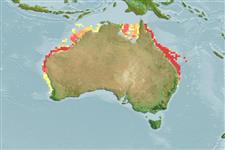Common names from other countries
>
Scombriformes (Mackerels) >
Scombridae (Mackerels, tunas, bonitos) > Scombrinae
Etymology: Grammatorcynus: Greek, gramma = signal, mark + Greek, rhyngchos = snout.
More on authors: Quoy & Gaimard.
Issue
Date Eschmeyer, pers. comm. Correction to Grammatorcynus is probably unjustified (Ref. 1830).
Environment: milieu / climate zone / depth range / distribution range
นิเวศวิทยา
เกี่ยวกับทะเล,น้ำเค็ม เกี่ยวกับหินโสโครก; สัตว์น้ำที่อาศัยและอพยพภายในทะเลเท่านั้น (Ref. 51243); ระดับความลึก 15 - 50 m (Ref. 86942). Subtropical; 12°S - 37°S, 110°E - 157°E (Ref. 168)
Western Pacific: known only from the northern coasts of Australia, south to Shark Bay in western Australia, along the east coast of Queensland south to northern New South Wales. Recently reported from the Gulf of Papua (Ref. 9684) and Ouvéa Atoll, Loyalty Islands (Ref. 13236).
ขนาด / น้ำหนัก / Age
Maturity: Lm ? range ? - ? cm
Max length : 112 cm FL เพศผู้/กระเทย; (Ref. 40637); น้ำหนักสูงสุดที่มีการรายงาน: 13.5 kg (Ref. 168)
เงี่ยงครีบหลัง (รวม) : 11 - 13; ก้านครีบอ่อนที่หาง (รวม) : 10 - 12; เงี่ยงครีบก้น: 0; ก้านครีบอ่อนที่ก้น: 11 - 13; สัตว์มีกระดูกสันหลัง: 31. Mouth relatively small, upper jaw reaching about to middle of eye. Pectoral fins stout. Interpelvic process short and single. No prominent anterior corselet present. Swim bladder present. Vertebrae 14 precaudal plus 17 caudal, total 31 as in the mackerels (Scomber and Rastrelliger).
Form schools near individual bays and reefs in Barrier Reef waters. With the rising tide, they move into shallow water over the reef flats, feeding on schools of clupeoid fishes that concentrate there. Utilized as a food fish.
Life cycle and mating behavior
Maturities | การสืบพันธุ์ | Spawnings | Egg(s) | Fecundities | ตัวอ่อน
Collette, B.B. and C.E. Nauen, 1983. FAO Species Catalogue. Vol. 2. Scombrids of the world. An annotated and illustrated catalogue of tunas, mackerels, bonitos and related species known to date. Rome: FAO. FAO Fish. Synop. 125(2):137 p. (Ref. 168)
IUCN Red List Status (Ref. 130435)
CITES (Ref. 128078)
Not Evaluated
Threat to humans
Harmless
Human uses
การประมง: การค้า; การตกปลาเป็นกีฬา: ใช่
เครื่องมือ
Special reports
Download XML
แหล่งที่มาจากอินเตอร์เน็ต
Estimates based on models
Preferred temperature (Ref.
115969): 22.6 - 27.8, mean 26.1 (based on 108 cells).
Phylogenetic diversity index (Ref.
82804): PD
50 = 0.7500 [Uniqueness, from 0.5 = low to 2.0 = high].
Bayesian length-weight: a=0.00955 (0.00464 - 0.01966), b=3.05 (2.88 - 3.22), in cm Total Length, based on LWR estimates for this (Sub)family-body shape (Ref.
93245).
ระดับชั้นอาหาร (Ref.
69278): 4.5 ±0.80 se; based on food items.
ความสามารถในการกลับคืนสู่ปกติ (Ref.
120179): ขนาดกลาง, เวลาต่ำสุดที่จะทำให้ประชากรเพิ่มขึ้นเป็น 2 เท่าใช้เวลา 1.4 - 4.4 ปี (Preliminary K or Fecundity.).
Fishing Vulnerability (Ref.
59153): High to very high vulnerability (75 of 100).
